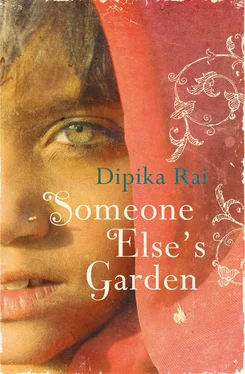The word out of his mouth, there was never any confusion in Asmara Didi’s mind as to her duty, and she aggressively grasped her role as surrogate mother and teacher. She instantly recognised a special stillness in Lokend, which she couldn’t shake in spite of her attempts to draw him into her world with childish games. Sometimes she thought she didn’t have to teach him anything, just jog his memory a little for ancient knowledge to pour out of his mouth in a fountain of pure speech.
She is glad she wasn’t picked to be his mother. There is something heart-rendingly tragic about a spiritual child because he belongs to everyone and to no one at the same time. It was her duty to formally impart the holy knowledge of scriptures to him. Luckily she knew the words of the Bhagvat Gita and the mantras of the Vedas. Her husband had been a bit of a dilettante with his learning, and though he never made it to the enlightened stage, he certainly knew the theory by heart. More than most, Asmara Didi and her husband had shared a closeness that rarely occurs in childless couples. It was to fulfil her role as companion that she had thrown herself equally into divine learning. But her knowledge wasn’t for herself, and it was only years later, in the employ of the Big House, that Asmara Didi realised it was fated for her tiny charge.
She looks at the old man’s face. It is a pleading face full of confused sorrow. He should have made peace with his son years ago. Such torment in a father is no good. Asmara Didi has come to know the staunchest part of the zamindar. It is a part certainly worthy of respect, perhaps even love.
‘Ra . . . hm Shingh’s ta . . . hlking . . . Lala,’ Singh Sahib’s thoughts are still with his elder son.
‘Why do you let him upset you like this?’ It’s clear the woman has no softness for the subject of their conversation.
‘Look Lok . . . hend. He . . . sh so . . .’
‘Different,’ she completes the sentence for him like she has been doing for years. ‘Some pups are born black, others white. That’s just the way it happens. It’s no one’s fault. Do you really wish Ram Singh was more like Lokend? You don’t really wish that, do you? Having a soul like Lokend’s is a huge burden.’
‘. . . but . . .’
‘Don’t you think Ram Singh wishes he was more like Lokend? Don’t you think he would be if he could? Be nice to him. That’s the least he deserves. He’ll come around.’ She knows it is no more possible to take her own advice than it is to bring back the black into her hair.
The father shakes his head, the only part of his body over which he has any real control. The zamindar may wish for Ram Singh to be more like Lokend, but he cannot accept his younger son or the path he has chosen. Singh Sahib is a temporal man. Lokend’s asceticism incenses him, he feels as if he has been somehow left behind by his son. You live vicariously through the lives of those you help. You remain detached and pure, a rock, loving everyone equally. Loving everyone equally, you love no one. But nothing I say gets to you. You are ice, freezing any water that comes to change you into a shape of yourself.
‘Is it better to spar with one or admire the other always from a distance?’ Asmara Didi asks, reading his thoughts. She knows it is Singh Sahib’s intransigence that keeps him deeply disappointed with both his sons. If he had his way, they would have turned out like him, with his values, playing by his rules, upholding his brand of honour.
* * *
It is that bright blue time of evening when the sky appears deep and close. The big man looks out of his window. It will be some time before the stars come out. How his wife loved this time of day. The cicadas are in full swing, and the house is rumbling with kitchen sounds. He doesn’t eat like they used to, still, the cooking goes on. Asmara Didi presides. She has taken him off garlic and onions and all manner of vegetables with tiny seeds. What does it matter? His tongue is dry from talking and disappointment. It feels like a piece of cardboard in his mouth.
He lets his thoughts return to her. Do you know what your son did today? He went to help those bandits surrender. Don’t shudder, meri jaan, it’s true, they will surrender and fill up the jails like cows returning home from the forests after a fat feed. He is giving away his share of the lands to them, and I can do nothing to stop him. He thinks zamindari is wrong. He said as much. In the eyes of God these lands aren’t ours, is what he said. After all these years he can still remember the parchment frailty of her body. She is as delicate as a deer’s leg. He can see her blood as it travels beneath her skin. She gets that familiar colour in her cheeks for no reason at all and looks so beautiful that he has to stop breathing. He can sense the pulse beating in her neck. That single pulse, up, down, up, down, ticks in unison with his own. Tick, tick, tick. He tries to push her away, but she stays. What can I do? I have to sit here and wait for news like a moulting bird. You are my only companion now. One of our sons gives away our lands while the other never tires of acquiring more. And they both do it in the name of honour! What do they know of real honour? Nothing. How could they, you say? I never taught them about my kind of honour. I should have brought them up after your death.
Talk to Lokend, you say. How can I? He defies me at every turn. That is a strange way to love a father, no? He owns the words, but somewhere inside there is admiration for his boy, so secret that even he doesn’t know it’s there, under the frustration, anger and guilt. Have I been a bad father? Maybe he is standing up for what he believes. I should know all about that, you say. I know what you think, my beliefs . . . my traditions, will be the death of me. You are probably right. That’s what used to upset you the most, our traditions . . .
Perhaps I should have allowed you to change some things around here, then you might have been happy. Oh, meri jaan, I miss you . . . Do you remember how we used to go hunting every winter? I know you cried inside yourself each time I bagged a deer. I’m not hungry, you would say at dinner, just so you wouldn’t have to eat its flesh, my dear sweet love. You were so delicate in so many ways, but so strong when you wanted to be. I remember our chess games, you were much better than me. Don’t think I didn’t notice that you let me win . . .
If you could see me now. Would you pity me? Would you love me? Your boy did this to me. No sooner do the words become a coherent thought than he regrets them. But everyone knows the zamindar blames Lokend for his stroke. I try not to think of it. But I can still smell the stink. There he was, on all fours like an animal, cleaning the shit with his hands. His hands, the hands you and I created, doing a Sudra’s work. It might as well have been my hands that were polluted. We are Singhs, we are not Sudras. I have never let the shadow of a Sudra fall on my family, and there he was, cleaning shit. Bibiji, you are the lucky one, dead before your son could baffle you with his behaviour. An angry tear struggles out of his good eye. Protected by darkness, he doesn’t wipe it away.
Every time he goes to the toilet he is reminded of that other shameful day. His son on his knees, holding a piece of wood piled high with brown human waste, a stinking brown blob with no sense of decency. It was slipping off its perch, sliding to the ground like a slow drip on a spider’s web. A taunting, insulting pile that his own son was handling with his pure, even loving, hands. Neither his son nor his pet mongoose was disturbed by his labour, by the stench of it or the blue flies that settled alternately on the brown mass and face unchecked because the hands that belonged to the face were too busy to wave them off. But that’s not what disgusted his father into a stroke. It was the complete sense of normalcy in Lokend’s bent back, as if he’d knelt to pet a favourite dog, that crippled the old man.
Читать дальше












